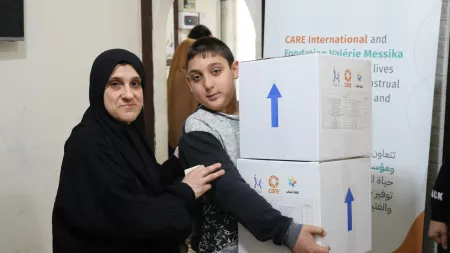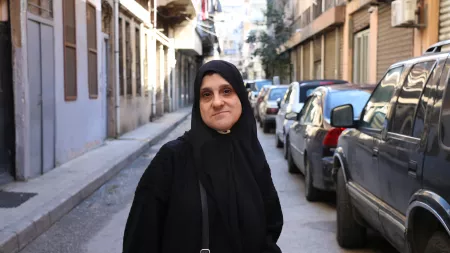As the economic situation continues to deteriorate in Lebanon, aid organizations face daunting challenges to meet the immense needs of the population, CARE International warned today.
On Monday, Lebanese banks ended a three-week strike. Strikes are also observed intermittently by public sector employees. This has been the case since January, including for teachers in public schools. Public schools have been closed for over a month and a half, heavily weighing on the education sector.
The Lebanese Lira continues its vertiginous fall against the dollar. Its fixed value in September 2019 was 1,500 Liras for a dollar; now, 1 USD is equivalent to 80,000 Liras. Otherwise put, in 2019, 100,000 Lebanese Liras had a value of 66 USD, today they are worth less than 1.5 USD. Adding to that, the Lebanese people have seen their life savings evaporate, with banks freezing the withdrawal of all deposits.
Pierre Valiquette, CARE Lebanon Country Director, said, “With the current acute economic crisis that Lebanon is facing, prices are rising every day and the populations living in the country are confronted with a tremendous challenge."
With days passing by, people are sinking more and more into poverty. It is becoming increasingly difficult for us to meet the immense needs of the population.Pierre Valiquette, CARE Lebanon Country Director
Today, 82% of the Lebanese population live in multidimensional poverty while social assistance programs are almost non-existent. Many households in the poorest areas of the country survive without electricity or heating; families lack food, which forces them to reduce their meals to two a day.
The World Bank has classified the Lebanese crisis as one of the 10 worst economic crises globally since the 19th century – and possibly even as one of the top three.
The price of bread, which is the staple food, is revised upwards several times a month, and the price of fuel, twice a day. Supermarkets no longer display the prices of goods because of the fluctuating Lira rate.
“The war in Ukraine and the rocketing fuel prices have also made things worse, even more so as the Lebanese have lived almost without government-produced electricity for the past two years and have had to rely on private generators for lighting. The increase in the price of fuel is also a problem for hospitals and motorists in a country where a public transport network is non-existent,” added Pierre Valiquette.
Since 2019, roads have been intermittently blocked due to various demonstrations and protest movements, a phenomenon that has intensified in recent weeks.
“With the beginning of the economic crisis three years ago, my husband left me with our triplets, who are now 13 years old,” says 45-year-old Samar. “With the vertiginous fall of the Lira, my husband, a day laborer in the building industry, worked less and less. He was depressed and he could no longer afford our expenses. I think that's why he left."

A lot has changed for Samar and her kids since 2019. “Today, it is my children who help me make ends meet. Every afternoon after school, they go to pick up plastic and scrap metal that they sell by the kilo.”
Samar, who is six months behind on her rent, is also indebted to the grocer. “I go into debt to buy oil and bread. My kids haven't eaten chicken and meat in months,” she says.
For media inquiries, please contact Patricia Khoder, Communications and Media Manager, CARE Lebanon via: [email protected] / 961 3 520 119
